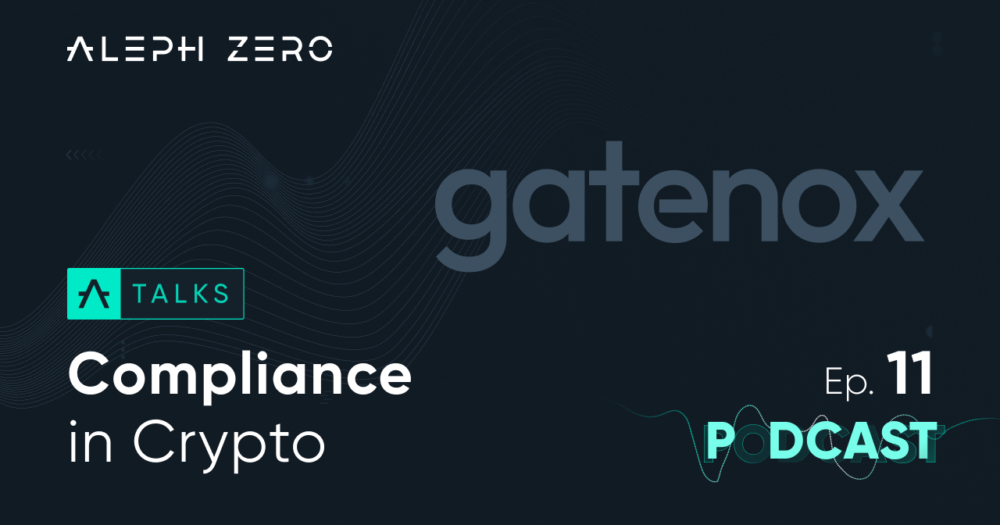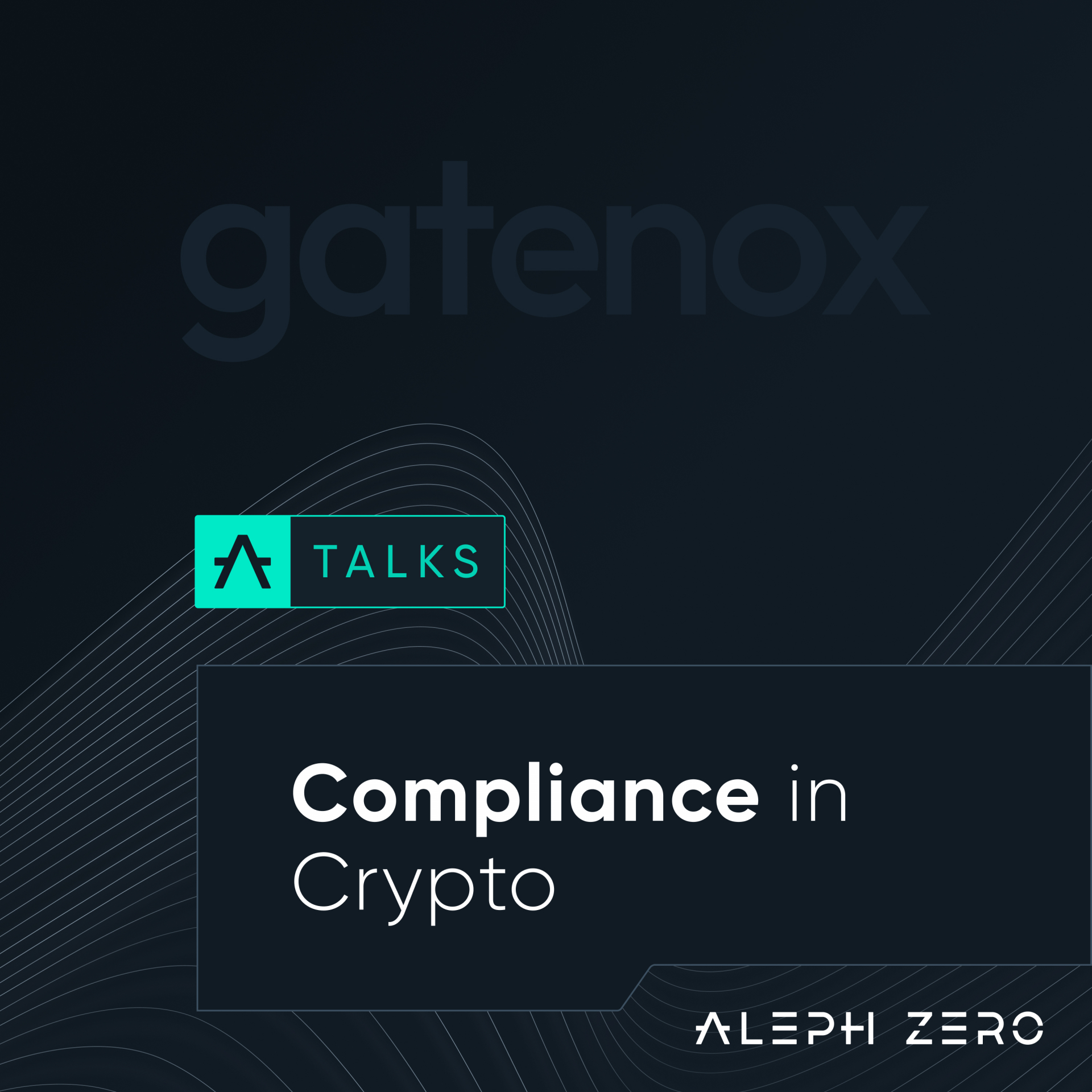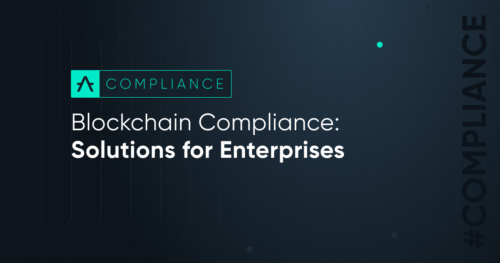Compliance in Crypto: Podcast Key Takeaways
Sep 8, 2023

The 11th episode of the Aleph Zero Podcast is dedicated to understanding the relationship between the crypto space and regulatory compliance, including KYC and AML laws, as explained by Gatenox’s Pawel Kuskowski.
Listen to the full episode on the platform of your choice
TL;DL
Too Long; Didn’t Listen
- Pawel Kuskowski has extensive experience in the world of financial regulations, having previously worked with the Royal Bank of Scotland as their Head of AML Functions and as the CEO and co-founder of Coinfirm.
- Coinfirm was designed to assist financial institutions, markets, merchants, and individuals in verifying and ensuring the compliance of novel blockchain products with established regulations.
- Anti-money laundering (AML) and know-your-customer (KYC) laws are important to ensure the safety of both users and institutions who wish to transact through novel blockchain and cryptocurrency technologies.
- AML laws are necessary to prevent money laundering, practices that erode the rules governing society.
- Paweł Kuskowski believes traditional finance is more effective at money laundering than blockchain and crypto solutions. Blockchain’s immutable nature, in which every transaction is appended to the blockchain and publicly visible, makes it much harder to get away with crime.
- Currently, most blockchains only offer pseudonymity, not true privacy.
- However, he also argues that there have been privacy blockchain projects that did offer privacy while abandoning any safeguards that prevented the technology from being used by malicious actors. These projects have been effectively sidelined by respectable financial actors.
- The road forward for crypto–and especially for private DeFi–is to offer genuine privacy that is also auditable by providing effective KYC and AML protection, a task Aleph Zero’s Liminal privacy layer is set to ensure.
- Large organizations and institutions will provide the push to introduce these solutions.
- Pawel Kuskowski’s recent Gatenox project is designed to provide a comprehensive compliance and verification hub for entities participating in the Web3 economy.
- The platform simplifies the corporate KYC process by offering an intuitive tool to offer data collection, sanctions checking, and identity verification.
Background and the Importance of AML and KYC
In the 11th episode of the Aleph Zero Podcast, we meet with Pawel Kuskowski to discuss the regulatory landscape and where it meets with Web3. Pawel has years of experience negotiating the legal terrain as the Head of AML Function for the Royal Bank of Scotland and later as a Chairman of the Compliance Association Poland and Advisory Board Member of the International Compliance Association.
His private ventures include co-founding Coinfirm and, more recently, Gatenox, a platform that offers a comprehensive compliance and verification hub for entities participating in the Web3 economy. The platform simplifies the corporate KYC process by providing an intuitive tool for data collection, sanctions checking, and identity verification.
During the episode, Pawel Kuskowski explains that AML and KYC laws provide institutions and participants of the economy with a clear set of rules according to which users are vetted to ensure that funds are not misused for crime or corruption.
Pawel witnessed firsthand the damaging effects of this legal void when growing up in communist Poland, where corruption was rampant. Now that a new digital economy is upon us, these regulations, which have governed traditional finance for decades, will move into the Web3 space, where they face their own set of challenges related to both the freedom-loving philosophy of the Web3 community and the unique properties of blockchain technology.
Blockchain and Regulations
Pawel mentions in the episode that traditional finance is surprisingly much more effective at money laundering than blockchain-based solutions. Despite having a reputation for harboring individuals who want to escape the attention of law enforcers, the immutable and transparent nature of blockchain makes it fairly easy to catch those who wish to avoid legal inquiry–if not immediately, then definitely at a later point in time.
This comes at the cost of blockchains not offering true privacy but merely pseudonymity. With some clever research, tracing pseudonymous accounts to their real-life owners is possible.
However, it must be noted that there have been projects that have offered complete privacy, much to the chagrin of law enforcement. This kind of protocol is not the solution for mainstream use, though, as most respectable institutions, companies, and CEXs have turned their back on these kinds of chains due to their association with criminal elements and the lack of ability to prove otherwise.
Pawel stressed that the future of Web3 projects must follow governing KYC and AML laws while offering a greater degree of privacy for users. The push for these changes will come from large institutions and organizations keenly interested in the possibilities resting in Web3.
Aleph Zero’s native privacy layer is designed to answer these needs by providing both retail users and institutions with an easy tool to ensure privacy while mitigating the risk of being blacklisted. Effectively, this is the path forward to a sustainable, private DeFi.
Listen podcast

EP. 11 Compliance, KYC, and AML in Crypto and Its Role in Blockchain Adoption
In the 11th episode of the Aleph Zero Podcast, we meet with Gatenox's Pawel Kuskowski to discuss the regulatory landscape, including KYC and AML laws. The almost hour-long talk examines how these regulations affect the crypto space and how their adoption will allow more businesses to become interested in the industry.


